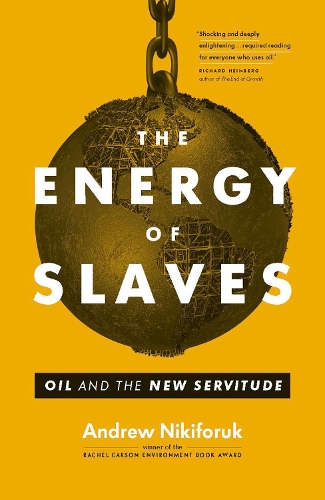
The Energy of Slaves: Oil and the New Servitude
(Hardback)
Available Formats
Publishing Details
The Energy of Slaves: Oil and the New Servitude
By (Author) Andrew Nikiforuk
Greystone Books,Canada
Greystone Books,Canada
18th September 2012
Canada
Classifications
General
Non Fiction
Social impact of environmental issues
Extractive industries
Environmental policy and protocols
Environmental economics
Slavery, enslaved persons and abolition of slavery
Geopolitics
333.8232
Physical Properties
Hardback
272
Width 139mm, Height 215mm
510g
Description
Ancient civilizations routinely relied on shackled human muscle. It took the energy of slaves to plant crops, clothe emperors, and build cities. In the early 19th century, the slave trade became one of the most profitable enterprises on the planet. Economists described the system as necessary for progress. Slaveholders viewed religious critics as hostilely as oil companies now regard environmentalists. Yet the abolition movement that triumphed in the 1850s had an invisible ally: coal and oil. As the world's most portable and versatile workers, fossil fuels replenished slavery's ranks with combustion engines and other labor-saving tools. Since then, oil has changed the course of human life on a global scale, transforming politics, economics, science, agriculture, gender, and even our concept of happiness. But as best-selling author Andrew Nikiforuk argues in this provocative book, we still behave like slaveholders in the way we use energy, and that urgently needs to change.
Cheap oil transformed the United States from a resilient republic into a global petroleum evangelical, then a sickly addict. Modern economics owes its unrealistic models to fossil fuels. On the global stage, petroleum has fueled a demographic explosion, turning 1 billion people into 7 billion in just a hundred years.
Reviews
"Our overwhelming societal dependence on oil is usually discussed in economic terms. This book looks at our Promethean petro-prowess through an ethical lens, and the result is both shocking and deeply enlightening. This is required reading for everyone who uses oil (do you know anyone who doesn't)."--Richard Heinberg, Senior Fellow, Post Carbon Institute, and author of The End of Growth and The Party's Over.
Author Bio
Andrew Nikiforuk is an award-winning Canadian journalist who has written about education, economics, and the environment for the last two decades. His books include Pandemonium; Saboteurs: Wiebo Ludwig's War against Oil, which won the Governor General's Literary Award for Non-Fiction; The Fourth Horseman; and Tar Sands, which won the Rachel Carson Environment Book Award and became a national bestseller. His most recent book, Empire of the Beetle, was nominated for the Governor General's Literary Award for Non-Fiction and selected as a top book of the year by both The Globe and Mail and Amazon.ca. He lives in Calgary, Alberta.
